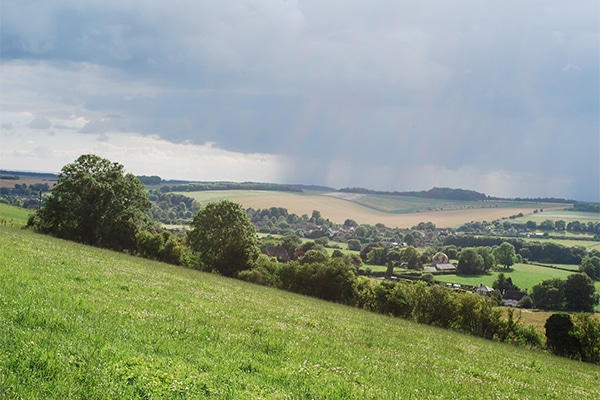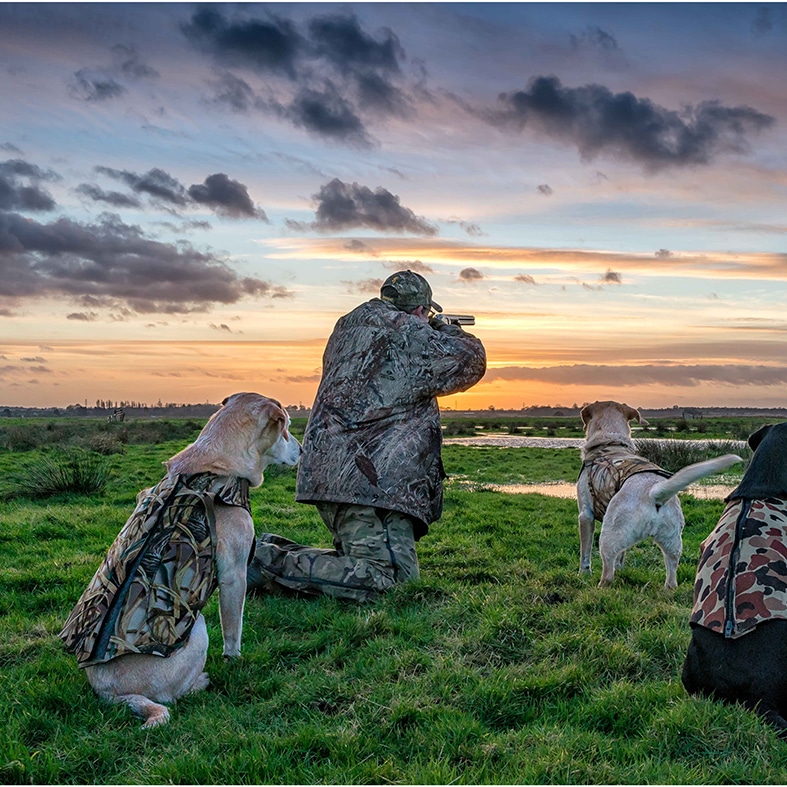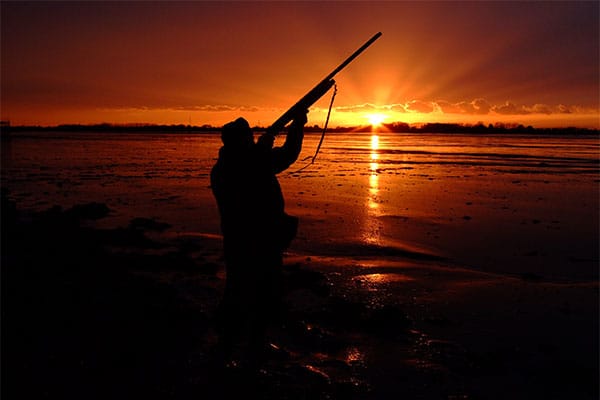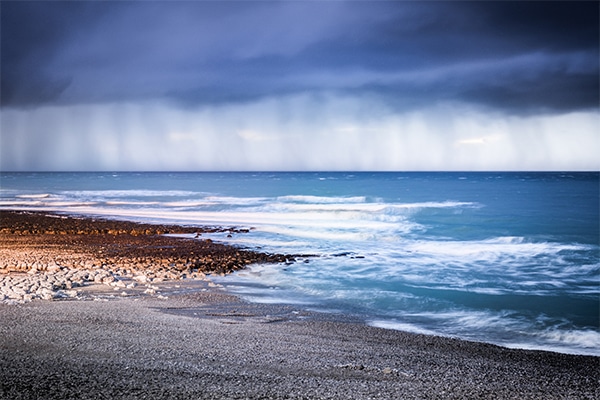
The Crown Estate
BASC-affiliated wildfowling clubs manage sporting rights on approximately 700km of foreshore owned by The Crown Estate in England, Wales and Northern Ireland.
Get information on the legal shooting season for mammals and birds in the UK.
Apply for funding for your project or make a donation today
Comprehensive information and advice from our specialist firearms team.
Everything you need to know about shotgun, rifle and airgun ammunition.
Find our up-to-date information, advice and links to government resources.
Everything you need to know on firearms law and licensing.
All the latest news and advice on general licences and how they affect you.


Home » Wildfowling » Wildfowling advice » Wildfowling code of practice
Wildfowling is the pursuit of wild ducks, geese and waders. It is carried out during the nominated season from 1 September to 31 January inland (above the height of an ordinary spring tide) and from 1 September to 20 February on the foreshore (below the height of an ordinary spring tide).
Wildfowling normally takes place at dawn and dusk but can occur at any time of day or night (apart from Northern Ireland, where night shooting is prohibited).
The skill is to make the most of the opportunities presented through an understanding of the quarry’s natural movement. Ducks and geese generally move both to and from feeding and roosting grounds at dawn and dusk. They will also move on the tide and at times around a full moon when the moonlight improves visibility and allows extra feeding time.
The aim of this code of practice is to give clear guidelines as to what is acceptable conduct, both for the newcomer to the sport and experienced wildfowlers. It also describes the general areas of the law relating to wildfowling, but it is not a full study of all relevant legislation in this area. It is vital that every wildfowler knows and understands the law relating to the sport. For clarification on specific laws relating to wildfowling, contact BASC head office, country or regional offices.

Want to check your wildfowling knowledge, take our free online test.
Wildfowling is the pursuit of wild ducks, geese and waders. It is carried out during the nominated season from 1 September to 31 January inland (above the height of an ordinary spring tide) and from 1 September to 20 February on the foreshore (below the height of an ordinary spring tide).
Wildfowling normally takes place at dawn and dusk but can occur at any time of day or night (apart from Northern Ireland, where night shooting is prohibited).
The skill is to make the most of the opportunities presented through an understanding of the quarry’s natural movement. Ducks and geese generally move both to and from feeding and roosting grounds at dawn and dusk. They will also move on the tide and at times around a full moon when the moonlight improves visibility and allows extra feeding time.
The aim of this code of practice is to give clear guidelines as to what is acceptable conduct, both for the newcomer to the sport and experienced wildfowlers. It also describes the general areas of the law relating to wildfowling, but it is not a full study of all relevant legislation in this area. It is vital that every wildfowler knows and understands the law relating to the sport. For clarification on specific laws relating to wildfowling, contact BASC head office, country or regional offices.
The wild ducks, geese and waders which are the legal quarry of wildfowlers, are largely migratory and overwinter in the UK, particularly in coastal areas.
Through sound conservation we can all work to ensure plentiful quarry species while benefiting the wider environment.
As some of the quarry species are in decline throughout their migratory transit route, it is essential to shoot responsibly and carry out conservation work in the form of habitat creation and predator control where possible.
This work will also benefit an array of other species. In addition to this, wildfowlers should record their bag and manage shooting levels to ensure the take and level of activity is sustainable. Most clubs require bag returns either as a condition of their lease or consent, or to asses and file for their own future reference.
High standards underpin public and political support for shooting, now and in the future.
This code provides advice at two levels:
The following golden rules apply:
| Duck | Geese | Waders | Other |
| Gadwall | Canada goose | Common snipe | Coot2 |
| Goldeneye | Greylag goose | Golden plover | Moorhen2 |
| Mallard | Pink-footed goose | Jack snipe1 | |
| Pintail | European white-fronted goose3 | Woodcock | |
| Pochard | |||
| Scaup1 | |||
| Shoveler | |||
| Teal | |||
| Tufted duck | |||
| Wigeon |
| Species | England and Wales | Scotland | Northern Ireland | Isle of Man |
| Duck and goose inland | Sep 1 – Jan 31 | Sep 1 – Jan 31 | Sep 1 – Jan 31 | Ducks – Sep 1 – Jan 31 Geese July 1 – Mar 31 |
| Duck and goose below HVM | Sep 1 – Feb 20 | Sep 1 – Feb 20 | Sep 1 – Jan 31 | Ducks Sep 1 – Jan 31 Geese July 1 – Mar 31 |
| Common snipe | Aug 12 – Jan 31 | Aug 12 – Jan 31 | Sep 1 – Jan 31 | Sep 1 – Jan 31 |
| Jack snipe | Protected | Protected | Sep 1 – Jan 31 | Protected |
| Woodcock | Oct 1 – Jan 31 | Sep 1 – Jan 31 | Oct 1 – Jan 31 | Oct 1 – Jan 31 |
| Golden plover | Sep 1 – Jan 31 | Sep 1 – Jan 31 | Sep 1 – Jan 31 | Protected |
| Coot/moorhen | Sep 1 – Jan 31 | Sep 1 – Jan 31 | Protected | Protected |
A double-barrelled 12 bore is a suitable all-round shotgun for wildfowling. If your fieldcraft is good you can be very successful with a standard 70mm (2¾ inch) chambered gun and cartridge. Traditionally, however, wildfowlers have often preferred a 76mm (3 inch) chambered gun which enables them to shoot heavier loads with more pellets in their pattern.
The measure of potential effectiveness is the count of pellets in the traditional 30-inch circle placed over the centre of the pattern printed on a pattern plate, or large sheet of paper. For example: Geese need a minimum 55 pellets in that circle; large ducks need 90+; small ducks 140. Effective pellet sizes vary according to the size of the quarry as they require enough energy to ensure penetration of the vital organs. Remember, the smaller the number, the bigger the pellet size.
Shot sizes for ducks: 5, 4, 3
Shot sizes for geese: 3, 2, 1, BB
We strongly recommend that you pattern your gun/cartridge combination to make sure it will deliver the appropriate killing load – provided, you can consistently centre your pattern on the target.
Following the ratification of the Agreement on the Conservation of African-Eurasian Migratory Waterbirds (AEWA) by the UK Government in 1999, the use of lead shot for all wildfowling has been made illegal in England and Wales, and for all shooting on or over wetlands (including foreshore) in Scotland and Northern Ireland.
The range of non-lead shot alternatives is growing and information on suitability for use in shotguns is available from BASC.
Numerous methods of killing or taking wild birds are prohibited. These include gin, spring, leg and pole traps, snares, nets, electrical scaring devices, poisonous substances, bows or crossbows, explosives (other than firearm ammunition), artificial light, mirror or dazzling devices, devices for illuminating a target or sighting device for night shooting, automatic or semi-automatic weapon (unless it is incapable of holding more than two rounds in the magazine), and shotguns with an internal diameter at muzzle more than 1¾ inches.
The use of sound recordings, and live decoy birds tethered, blinded or maimed is illegal. It is also an offence to cause or permit such methods to be used.
It is an offence to use any mechanically-propelled vehicle, including boats, in immediate pursuit of a wild bird to kill or take it.
England and Wales
Before the passing of the Wildlife and Countryside Act 1981, orders prohibiting the shooting of wildfowl on Sundays were made under the Protection of Birds Act 1954. These orders have not been rescinded and so in the following counties/part counties the shooting of wildfowl is prohibited on Sundays: Anglesey, Brecknock, Caernarfon, Carmarthen, Cardigan, Cornwall, Denbigh, Devon, Doncaster, Glamorgan, Great Yarmouth County Borough, Isle of Ely, Leeds County Borough, Merioneth, Norfolk, Pembroke, Somerset and North and West Ridings of Yorkshire.
There may be local restrictions on shooting at night. Ensure club rules are checked.
Scotland
Wildfowl and waders may not be shot on Sundays and on Christmas Day.
Northern Ireland
All wild birds are protected on Sundays, Christmas Day and at night (defined as commencing one hour after sunset on any day and ending one hour before sunrise the next day).
Under exceptional circumstances of prolonged severe weather, the relevant Government Minister may protect by order any species of duck, goose, wader, snipe, woodcock, coot and moorhen for certain periods, normally of not more than 14 days. The Minister will act in accordance with criteria and procedures previously agreed by Government and shooting and conservation organisations.
Any such suspensions are widely publicised. Typically, a statutory suspension comes into force after 14 days of severe weather (as defined) and can be imposed separately in any of the UK countries.
Please note, after seven days of severe weather, BASC may well call on all waterfowl shooters to exercise restraint in their shooting if it appears that birds are under pressure from the weather conditions.
Full details of the severe weather procedures, how any voluntary restraint measures can be put in place, and when and where any statutory suspensions are in force, will be published on the BASC website and updated frequently.
It is advisable to have adequate liability (third-party) insurance when shooting. Membership of BASC includes insurance for recreational sporting activities.

BASC-affiliated wildfowling clubs manage sporting rights on approximately 700km of foreshore owned by The Crown Estate in England, Wales and Northern Ireland.

Read our code of practice on shooting wildfowl, waders and rail species sustainably in England, Scotland and Wales.

In periods of prolonged severe weather the relevant government ministers have the power to make protection orders suspending the shooting of wildfowl and waders.